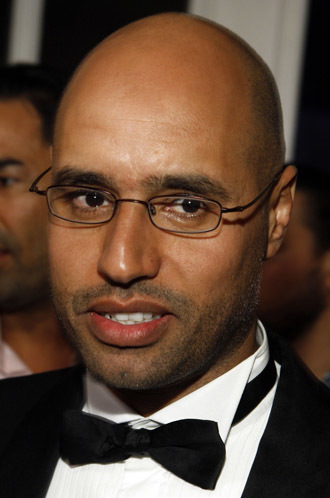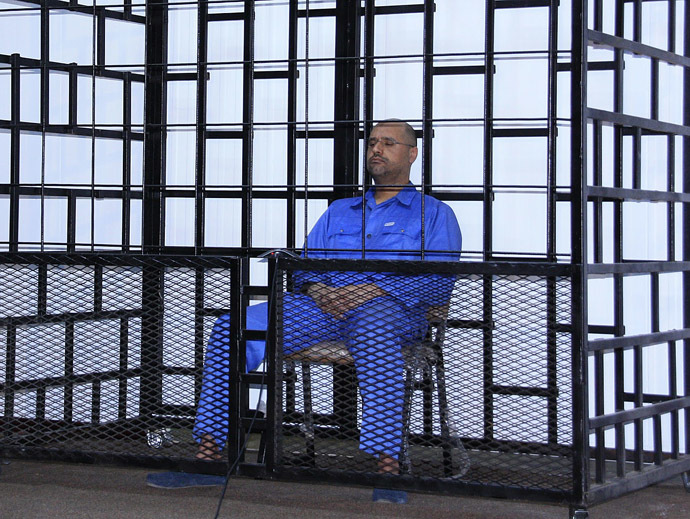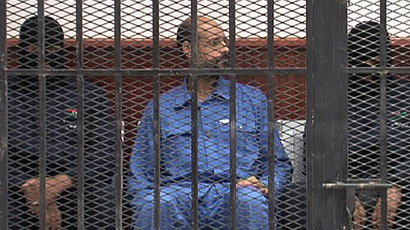‘Being called Gaddafi is enough to condemn people in the eyes of the world' – lawyer
Once a welcome guest in European high society, Saif al-Islam Gaddafi now awaits trial for his alleged role in the 2011 uprising. Libyan militias are refusing to hand him over to the Hague tribunal, while skeptics doubt he will face a fair trial at home.
The son of Libya’s former ruler Muammar Gaddafi, along with the country’s former military intelligence chief, has been indicted by the International Criminal Court (ICC) on war crimes charges. The International Criminal Court ordered that Saif Gaddafi be delivered to The Hague over two years ago. However, he is being held in the city of Zintan, in western Libya, by the militia that captured him. While in his militia-controlled jail, Saif had parts of his fingers amputated, Reuters reported in 2011. The country’s authorities claim the injuries were sustained in a NATO airstrike.

Saif Gaddafi’s latest hearing was postponed to November 16, after
he failed to appear by video link from jail. This has triggered
concerns over his safety.
His lawyer told RT that he hasn't been able to contact his client
directly for two years.
"Under international law, Libya has an obligation to deliver
him to The Hague - obviously this hasn't happened so far,” John
Jones told RT. “The sad fact is, the ICC has made this order and
it hasn't been respected, and there's been no follow-up by the
Security Council. Simply bearing the name Gaddafi is enough to
condemn people in the eyes of the world, in the eyes of the
international community."
Jones added that it's very hard to say whether political security
conditions in Libya will change so that he may be delivered to
The Hague one day. Libyan government lawyers have repeatedly
claimed that Libya can guarantee Saif Gaddafi a fair trial.
In 2012, Libyan authorities detained a team of International
Criminal Court lawyers, accusing them of trying to pass
"dangerous documents" to Saif Gaddafi. They spent nearly
a month under arrest. Local authorities claimed that Australian
lawyer Melinda Taylor was caught red-handed passing secret
letters to him.
"We were never provided with an order or decision concerning
the legal basis for our arrest and detention, or for the search
and seizure of privileged and confidential ICC documents, or for
the breach of Libya's promise to the ICC to implement a
privileged visit with Mr Saif Al-Islam. It is the position of the
defense that these recent events have completely underscored that
are being possible for Saif Al-Islam to be tried in an
independent and impartial manner in Libyan courts," Taylor
said.
Saif Gaddafi, a London-educated PhD graduate, has said he would
prefer to be tried by the International Criminal Court. His
lawyer also told RT he'd rather see Gaddafi tried by the ICC.
Libya has been defying its ruling to hand him over, however.

Contacted by RT, human rights groups appeared to be in the dark
about Said Gaddafi’s current conditions of detention. Amnesty
International appeared not to have any new information, while
Human Rights Watch redirected RT to its earlier news releases.
The US State Department also proved to be clueless.
Amnesty, who was granted access to Saif Gaddafi in September, and
Human Rights Watch, who last saw him in January, said he was
being held in secret detention without access to a lawyer.
Before Libya's old regime was toppled, Saif Gaddafi was the
country's second most-powerful figure after this father, who had
been in power since 1969.
The charming English speaker was a darling in the West and among
British high society, being a close friend of billionaire Nat
Rothschild.
Saif Gaddafi was in charge of the Libyan Investment Authority, a
government fund worth up to $100 billion dollars. But all that
changed with the 2011 NATO-backed revolt. Together with his
younger brother Saadi, Saif has been accused of war crimes during
Libya’s eight-month civil war, which saw thousands killed.
Meanwhile, Libya currently has two rival administrations: an
elected parliament and internationally-recognized government, and
an Islamist administration in Tripoli, appointed by a coalition
of armed forces who seized the capital in August.
The authorities told RT's Bel Trew, reporting from Tripoli, that
fighting between warring factions is too fierce to even continue
Saif Gaddafi’s trial in Libya, let alone get him to The Hague.
They also argue that since he committed crimes against Libyans in
Libya, he should face justice there. They claim he is being
treated "very well" and has had access to lawyers.
But as the struggle for control of various cities is in full
swing, human rights observers say they cannot gain access to Saif
Gaddafi or any other detainees to verify this information.













